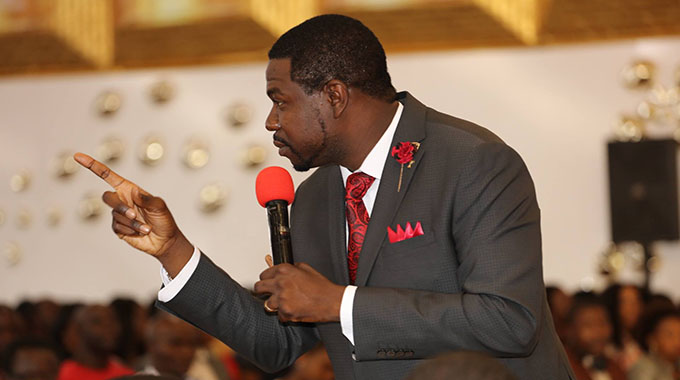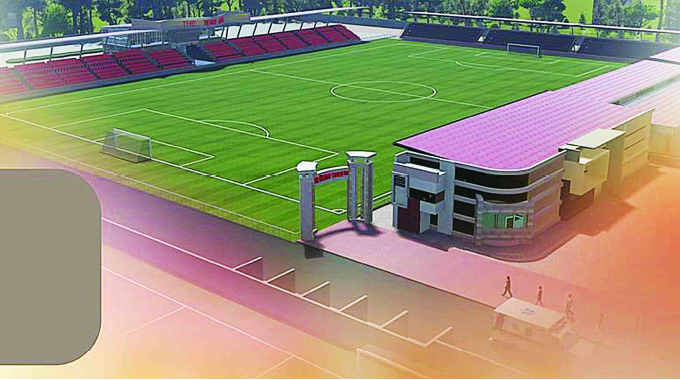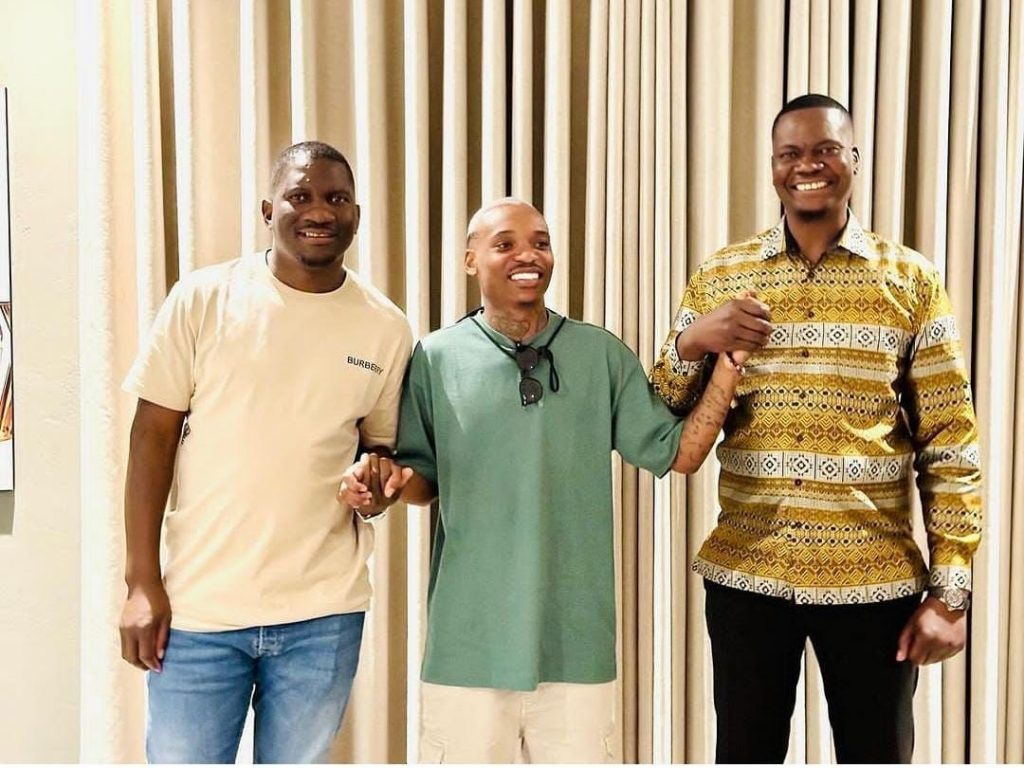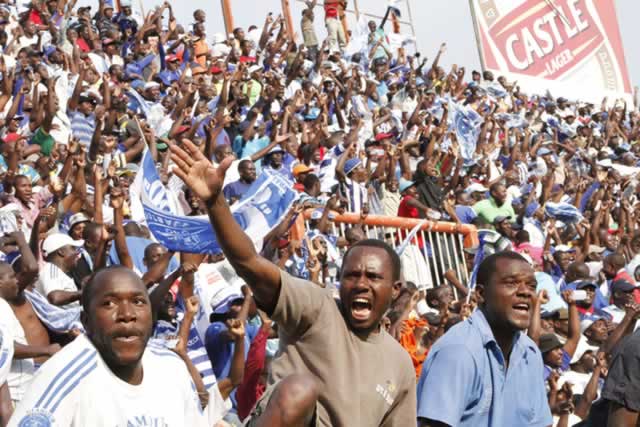BY ENOCK MUCHINJO
HARARE – Whiling away the Saturday afternoon at a junior cricket tournament seven years ago, a small but engrossed crowd watching football at an adjacent pitch made it sound more fun, so I decided to move across.
From a distance it looked like a practice session involving the same team, or a social match. Definitely not a competitive game. But any questions why the spectators were deeply immersed in such a low-key affair were immediately answered by the identity of one of the players sweating it out on the field.
Something picked up by the onlookers, and they whispered gleefully to each other about it, was how the opposing side was rather cautious about making any sort of physical contact with this particular player. Not only because he was a huge bear of a man to take on. He was also, in fact, Walter Magaya, one of Zimbabwe’s most popular preachers and owner of the football club he was training with that day.
Self-styled prophet Walter Magaya, founder of the Prophetic Healing and Deliverance Ministries (PHD) – possibly Zimbabwe’s biggest church now – is a football fan said to have been a gifted player in his younger days.
Frequently, Magaya trains with his club, Yadah FC, when his pastoral duties allows. On this afternoon of August 2017 at the multi-purpose Alexandra Sports Club in Harare, the popular cleric chose to play a “friendly” with the reserves of his Zimbabwean Premier League club, who were joined by young trialists hoping to make the grade at Yadah.
Magaya’s first touch and off-the-ball movement backed up his claim that at some point in his life he had seriously considered pursuing a footballing career. Stamina-wise, he was as fit as any part-time footballer could be at his age, 34 years old at that time.
In spite of the opposition’s hesitancy to close him down, an animated Magaya constantly teased markers with the ball at his feet – provocatively inviting them to a contest. Until one particularly eager youngster was forced to accept the challenge. He went in with a firm and fair tackle, but one that only succeeded in sending the enormous frame of the prophet sprawling on the turf.
Wry smile on his face, and still on the ground, Magaya threw his arms up in the air in protest, bellowing: “But ref…!”
The offending player, not sure how to react to his “foul” on the boss, had tried to mumble a few words of remorse. Magaya hauled himself up and gave the defender a playful chase, quickly catching up with the young fellow and landing a few gentle pats on his head to a round of laughter around the ground.
A curious episode at end the training session would be sight of a handful of beautiful young women, presumably devout congregants of Magaya’s church, kneeling in front of the prophet to ask for his sweaty socks which were duly given to them much to their delight.
Muscular bodyguards were at hand to escort the “man of God” to the changing rooms, and to his waiting flashy fleet of cars.
An unexpected spectacle on a lazy Saturday afternoon.
Wealthy, and ‘generosity’ towards football
Prophet Walter Magaya has accumulated a vast fortune through his PHD Ministries, which was founded in 2012 in Chitungwiza – just outside Harare – with only 45 people in attendance according the church’s website.
PHD now has several branches countrywide, and the church’s headquarters sit on a large piece of property in Waterfalls, a middle-income Harare suburb.
Magaya’s Sunday services there attracts massive crowds, drawn to the allure of miracles and blessings. His special crusades, in and outside Zimbabwe, are attended by thousands of awestruck believers from different African countries.
In his early 40s now, Magaya performs what his church calls miracles, and preaches the gospel of prosperity. He is not himself shy to flaunt his own personal wealth, gained of course from evangelism.

Walter Magaya preaching at his PHD Ministries church in Waterfalls, Harare.
PHD makes a killing with the sale at mass scale of church material such as wrist-bands and the highly sought-after one, anointing oil, meant for divine protection. It has been said that the oil can now also heal diseases such as cancers.
With this cash inflow, Magaya has risen from the impoverished surroundings of his Chitungwiza hometown to build his swanky church on huge landscape in the capital city.
Soon to follow was construction of the five-star Yadah Hotel, just a stone-throw away from the church. It’s an unconventional piece of architecture, with a cosy and luxurious look.
At his hotel, Magaya accommodates Zimbabwe’s national team for training camps, free of charge.
While putting up at Yadah Hotel, the Warriors do not have to move a long way for practice. The hotel has a state-of-the-art training facility, complete with a standard football pitch.
Magaya’s generosity extends to bailing out the country’s football body, Zifa. In 2015, he persuaded the national team not to boycott an Africa Cup of Nations qualifier against Guinea, giving the players US$20 000 to share and pledging another sum of $30 000 if the federation failed to pay them after the match.
Zifa, which is often cash-strapped, has been desperately grateful for these kind gestures.
Spreading influence through football, and courting controversy
In November 2017, just days before the military coup that toppled President Robert Mugabe, Zimbabwe’s government paid in the region of US$1.5 million to host former star players of Spanish and European giants Barcelona.
The Barca legends landed in Harare for a friendly match against former Zimbabwe internationals in an arrangement not devoid of controversy.
The increasingly unpopular and authoritarian Zimbabwean government, led by the despotic Mugabe, was heavily criticised by opponents for “wrong priorities” as the country battled serious economic and political crisis.
In stark contrast to the irresistible windfall of the ex-Barcelona men, an anonymous columnist in a state-owned weekly newspaper wrote that Zimbabwe’s own players were each paid a fee of US$2 400 to participate.
They included former Manchester City forward Benjani Mwaruwari and fellow former national team captain Peter Ndlovu, who is widely regarded as Zimbabwe’s greatest player of all time.
Even though the government footed the cost of the event, Prophet Magaya’s growing influence in Zimbabwean football was now obvious.
Zifa, which organised the match on behalf of the government, appointed the clergyman as “chief liaison officer” of the Zimbabwe Legends side.
The ex-La Liga stars – who included Patrick Kluivert, Edgar Davids, Rivaldo, Gianlucca Zambrotta, Ludovic Giuly and others – were booked at the prophet’s Yadah Hotel after Magaya “offered accommodation” at his lodgings.
Magaya himself unexpectedly featured in the match as a “guest player”, coming on as a second half substitute.
It was strongly believed that Magaya’s involvement in the whole affair actually went further beyond.
The match itself produced a festival atmosphere and an exciting 2-2 draw, quite a treat for the thousands of spectators who paid the ticket prices of US$2, US$10 and US$50 at Harare’s National Sports Stadium.
It wouldn’t be a stretch to say that a big chunk of the strong 45 000 crowd were church members of Magaya’s PHD Ministries, for the man always has his fiercely loyal band of followers in tow.
While Magaya’s admirers staunchly follow him, so does controversy, both at church and in football.
In August 2023, world famous Italian club Juventus were forced to dispel claims by Yadah FC that the Zimbabwean club had partnered the Serie A titans in a deal to “scout young talent” in the Southern African country.
Marco Degortes, a Juventus official, was quoted as saying: “The club does not have any programme in Zimbabwe, and nobody has the official right to run any activities on behalf of Juventus.”
Underneath the charisma, the prophet is also prone to uncontrollable flashes of rage. In 2015, he was accused of assault by Nyasha Chanakira, a supporter of an opposing team, who claimed that Magaya struck him three times in the face in annoyance at how he had enthusiastically celebrated his team’s winning goal.
The stadium that Prophet built
It has been four years since Zimbabwe was banned from hosting international matches due to substandard stadiums.
The February 2020 sanction stemmed from an inspection visit by the Confederation of African Football (Caf) late 2019, when the African football body ordered Zimbabwe to upgrade its facilities.
The Zimbabwean FA was however given permission, nine months later, to host Algeria for an Africa Cup of Nations qualifier in November 2020 because a limited number of spectators were allowed inside the ground due to Covid-19 restrictions.
That would be the last time Zimbabwe played any competitive game at home.
Last November, Zimbabwe grabbed unwanted global headlines after playing its home World Cup qualifier against Nigeria in Rwanda.
After three years in the wilderness, Zimbabwe’s homecoming could well be at a new stadium built by Prophet Magaya on his vast church property.
It’s a charming little stadium that fulfils most requirements of modern stadia.

The newly-constructed Heart Stadium in Harare, built by Prophet Magaya.
Magaya says Heart Stadium, which was built rapidly in a space of months, was constructed at great personal sacrifice to him.
“This was driven by my heart,” Magaya told Harare tabloid H-Metro in December.
“I can tell you that I had to sell some of my assets just to kick start this project. I even quarrelled with my family as they wanted to stop me from this undertaking. But, eventually, they saw the light and they decided to give me their support.
“I am happy the project will now be commissioned and it’s not for my own use. It’s for football. I love football and this is for the game that I like the most.”
President Emmerson Mnangagwa officially opened the stadium in December at a glitzy ceremony attended by several prominent figures in the country. In other words, the upper echelons of Zimbabwean society and pretty much Magaya’s circles.
Zimbabwe will resume its World Cup qualification bid at home against Lesotho in June but four months way, the country is still without an approved stadium.
Apart from building the stadium primarily for his club Yadah – who are nicknamed the Miracle Boys – Magaya’s great desire is to see the Warriors playing at Heart Stadium as soon as that Lesotho clash.
But a lot more work still has to be done on the stadium for it to be certified by world football ruling body Fifa, notably increasing the seating capacity from the current 5 000.
If the kind of workmanship put in the initial project is applied, what can possibly stand in the way?
The political connections in football
Zimbabwean football powerhouse Dynamos had emerged as favourites to sign Khama Billiat on his shock return home, but other local clubs quickly joined the race for the former Mamelodi Sundowns and Kaizer Chiefs maestro.
Amid speculation over the team that was likely to land Billiat’s signature, one of the first images of him after arriving in the country from South Africa this week gave away his destination, and demonstrated the magnetism of cash.
In one of the pictures that circulated, Billiat is seen with two well-known Zimbabwean ruling party politicians.
He is sandwiched between Scott Sakupwanya and Mike Chimombe, both entrepreneurs and members of Zanu-PF. All three are holding hands, their faces beaming with achievement.

Khama Billiat (middle) pictured with Zanu-PF politicians Scott Sakupwanya (left) and Mike Chimombe.
Controversial gold dealer Sakupwanya is now a Zanu-PF MP who initially lost last August’s election to the opposition CCC’s candidate in a constituency of Harare’s townships before he was helped to Parliament by a skewed by-election.
Through his gold company Better Brands Jewellery, the youthful Sakupwanya sponsors Magaya’s Yadah FC, which unveiled the 33-year-old Billiat this week, beating Zimbabwe’s biggest club Dynamos to the signature of the former Warriors wizard.
Sakupwanya – who takes pictures of himself with stacks of 100 US dollar notes and bars of gold – is friends with Magaya and was last year reported to have tabled a takeover offer to acquire the prophet’s club.
Another angle of interest is that the managing director of Sakupwanya’s company is Cuthbert Chitima – a banker and former senior employee of Stanbic Bank Zimbabwe – who needs no introduction to Yadah FC.
Chitima was the founding owner of the original team, then known as Gunners FC, formed in 2005. The club was then briefly known as Yadah Gunners after Magaya bought it from him in 2013, before later dropping the Gunners name altogether.
Snatching Billiat from under the giants’ noses
All signs had pointed to Billiat joining Harare giants Dynamos, seven months after the diminutive playmaker refused to extend his stay at Kaizer Chiefs by a season when his contract expired last June.
With no other club offering a deal in the riches of the South African Premiership, as Billiat had confidently anticipated following his dramatic Chiefs exit, Dynamos appeared a more dignified downgrade in a sense.
Dynamos, who goes by the moniker Glamour Boys, is Zimbabwe’s biggest and most successful club with 22 league titles since its formation in 1963.
The Hararians will this year play in the Caf Confederations Cup, a platform Billiat could have used to wave his magic again and perhaps secure a quick return to Mzansi. It has also been reported that Dynamos had been Billiat’s first preference.
The passionately supported record Zimbabwean champions, who have a history of financial instability, reportedly dithered over Billiat’s salary and a counter-offer was made by the Miracle Boys.
Zimbabwe’s new domestic season begins in March. Billiat becomes the highest paid player in the country by a mile on his return to his homeland, nearly 14 years after he left as a raw teenager with nothing but the makings of a potential superstar.
He will earn a monthly salary of US$5 000 (roughly R97 000) at Yadah, on top of the $20 000 (about R386 000) sign-on fee he received.
Now, this is nowhere near as big as the amounts he amassed down south. But in Zimbabwe, that guarantees a comfortable life for any professional.
Billiat’s move to Yadah has however, not surprisingly, riled Dynamos. Vice-chairman Vincent Chawonza labelled Billiat’s agents “unprofessional” for the manner in which they handled the collapsed negotiations with his club.
The tough-talking official was clearly unimpressed and didn’t hold back, angrily remarking that the nimble-footed attacker’s snub of Dynamos, on the last minute, was similar to his unceremonious departure from Kaizer Chiefs.
“People who are around him (Billiat) are ill-advising him,” Chawonza told Zimbabwean paper Newsday on Thursday.
“I think the blame goes to his managers, starting with the decision not to renew his stay at Kaizer Chiefs. He wasn’t supposed to leave Kaizer Chiefs in the first place. We tabled a similar offer as Yadah, but they were swift and gave him cash on Tuesday when he arrived.”
Chawonza has however been sacked by the club this Friday evening, a day after his comments were published, but it has not been immediately made clear whether his dismissal is linked to his Billiat outburst.

Reports in local press said Khama Billiat was keen on playing in front of these passionate Dynamos supporters before Yadah counter-offered.
Dynamos legend and former captain Justice Majabvi also appeared to indirectly criticise Billiat for his choice, posting on X: “Most players don’t know and understand how big is @OfficialDynamos until you are playing for them. #7m.”
The “7m” in Majabvi’s post stands for seven million, the number of supporters Dynamos lay claim to.
Real or imagined, those numbers are nowhere remotely close to what Yadah have.
But the Miracle Boys have deeper pockets, and they might also have a miracle for Billiat’s career revival, with deliverance by Prophet.



























